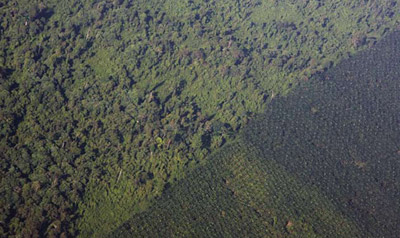Oil palm plantations support substantially less biodiversity than natural forests when it comes to ant species, reports new research published in Basic and Applied Ecology.
Tom Fayle, a Cambridge University biologist, and colleagues sampled ant populations in a rainforest in Danum Valley Conservation Area and nearby oil palm plantations in Sabah, a state in Malaysian Borneo. The researchers counted 16,000 worker ants from 309 species in the natural forest but only in 110 species at the oil palm plantation.
The results are similar findings for other groups of animals, including birds and butterflies. Overall oil palm plantations are biologically impoverished relative to even selectively logged forests. The single-species monoculture offers fewer ecological niches than natural forests, providing fewer opportunities for plants and animals.
“Although oil palm plantations a higher diversity of ants than previously reported, we found that expansion of oil palm into rain forest still causes the loss of 81% of forest ant species,” Fayle told mongabay.com.

Oil palm plantation and logged natural forest,
Sabah, Malaysia. Photo: R. Butler/mongabay.com
The researchers also noted that invasive species are more common in oil palm plantations.
Fayle, T.M., et al (2010). Oil palm expansion into rain forest greatly reduces ant biodiversity in canopy, epiphytes and leaf-litter. Basic and Applied Ecology 11: 337-345 doi:10.1016/j.baae.2009.12.009
-
Abstract: Oil palm cultivation is expanding rapidly into many of the world’s most biodiverse tropical regions. One of the most functionally important and ecologically dominant animal groups in these environments is the ants. Here, we quantify the overall impacts of clear-felling lowland dipterocarp rainforest and conversion into oil palm plantation on ant diversity. At study sites in Sabah, Malaysia we collected ants from three microhabitats: 1 – the canopy, 2 – bird’s nest ferns ( Asplenium nidus complex, a common epiphyte in forest and oil palm), and 3 – leaf litter. We also measured temperature, humidity and light at collection sites to assess their impacts on ant community composition. Total ant species richness decreased from 309 to 110 (−64%) between forest and oil palm plantation. However, this impact was not the same across all microhabitats, with bird’s nest ferns maintaining almost the same number of ant species in oil palm compared to forest (forest-oil palm, ferns: 36–35 (3% loss), canopy: 120–58 (52% loss), leaf litter: 216–56 (74% loss)). Relative abundance distributions remained the same for fern-dwelling ants, but became less even for oil palm ants in both the canopy and the leaf litter. These differences may be due in part to the ability of bird’s nest ferns to provide a stable microclimate in hot, dry plantations. We also found that non-native ant species were more abundant in oil palm than in forest, and few forest ant species survived in plantations in any of the microhabitats. Only 59 of the 309 forest species persisted in oil palm plantations, corresponding to an 81% loss of forest species resulting from habitat conversion. Although oil palm supports many more ant species than has been previously reported, converting forest into plantation still leads to a dramatic reduction in species richness. The maintenance of forested areas is therefore vital for the conservation of ant biodiversity.
Related articles
Biodiversity of rainforests should not be compared with oil palm plantations says palm oil council chief
(11/11/2008) Scientists should compare the biodiversity oil palm plantations to other industrial monocultures, not the rainforests they replace, said Dr. Yusof Basiron, CEO of the Malaysian Palm Oil Council (MPOC), in a post on his blog. Basiron’s comments are noteworthy because until now he has maintained that oil palm plantations are “planted forests” rather than an industrial crop.
Rainforest conversion to oil palm causes 83% of wildlife to disappear
(09/15/2008) Conversion of primary rainforest to an oil palm plantation results in a loss of more than 80 percent of species, reports a new comprehensive review of the impacts of growing palm oil production. The research is published in the journal Trends in Ecology and Evolution.
Palm oil boycott an unrealistic approach to conserving biodiversity
(04/15/2008) Boycotting palm oil produced in Southeast Asia in an “unrealistic” and “ineffective” approach to conserving the region’s fast-disappearing rainforests, said a Princeton University researcher speaking at a conference on the sustainability of palm oil. Instead, NGOs should focus on engaging and working with the palm oil industry to reduce its impact on the environment. Addressing the first International Palm Oil Sustainability Conference in Kota Kinabalu, Malaysia, Princeton biologist Dr. David S. Wilcove said that the palm oil industry is too important to the economies of Indonesia and Malaysia to justify blanket import bans on the edible oil used in food, cosmetics, industrial products, and biodiesel. The palm oil industry contributes to health, education, and infrastructure in rural areas.
Rainforest conversion to oil palm causes 83% of wildlife to disappear
(09/15/2008) Conversion of primary rainforest to an oil palm plantation results in a loss of more than 80 percent of species, reports a new comprehensive review of the impacts of growing palm oil production. The research is published in the journal Trends in Ecology and Evolution.